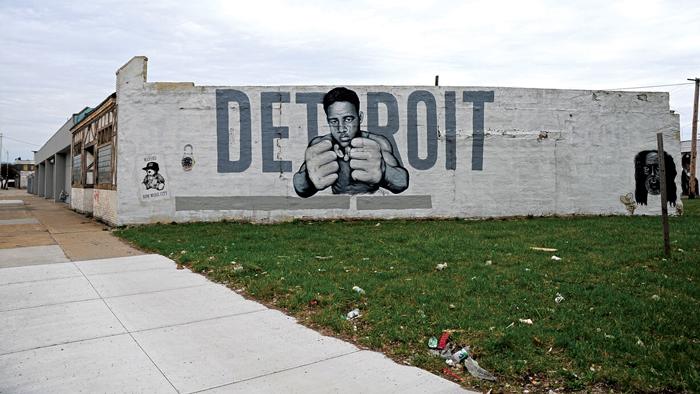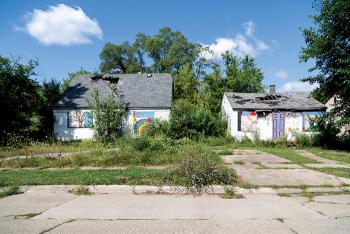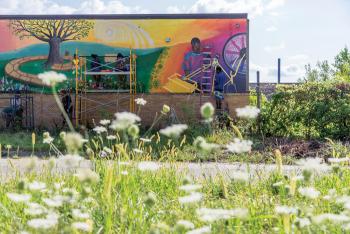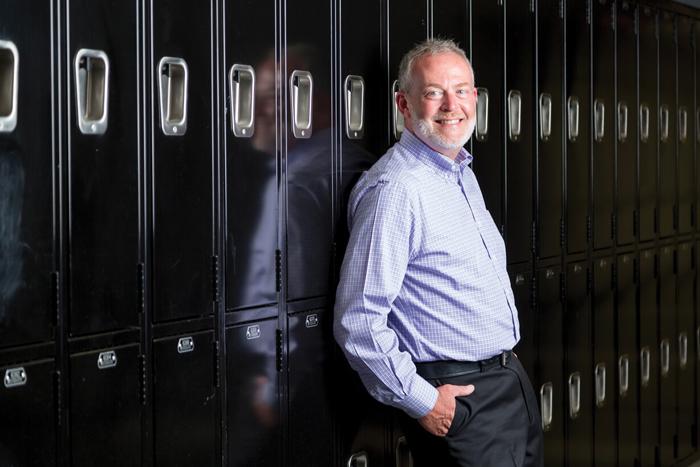It’s the winter of 2017. My seventh-grade ELA students and I just finished a unit on stories of resilience and resistance. We read speeches from César Chávez and Martin Luther King and poems from Junot Díaz, Francisco X. Alarcón and Sherman Alexie. We watched videos about Standing Rock and #BlackLivesMatter. We discussed the power of nonviolent resistance and community-building. And we connected historic struggles with current oppressions.
My students engaged deeply with the curriculum, openly discussed and listened to each other’s ideas, made connections with their own experiences as young people living in southwest Detroit.
On the last day of our unit, I sat in my school’s cafeteria as my students collaboratively hosted our capstone project: a “student speak-out” for their families and the school staff. They shared poems, stories and reflections, all calling out against injustices.
As I watched my students display profound courage and wisdom through their stories, I kept thinking, “You can’t standardize this.” Regardless of what the state data says, regardless of their test scores and their English language proficiencies, my students are brilliant and they have something important to say. I sat in the cafeteria, beaming with pride.


This story from my own teaching experience served as a catalyst for me to challenge oversimplified and deficit-narratives of Detroit schools. Yes, in far too many systemic and institutional ways, Detroit schools are failing our students. Issues that are common to urban districts—lack of resources, high turnover rates, poor school conditions, etc.—are exacerbated in Detroit because of its history and context. And despite the narrative of the city of Detroit being “reborn,” its schools and its neighborhoods, filled with people who’ve been here for generations, continue to be stripped of resources.

Detroit public schools have, for example, experienced a dramatic decline in student population—from 156,000 public school students in 2002 to 46,000 today. The city’s shrinking numbers are only partially responsible for this decline; school choice policies and the unregulated expansion of charter schools pushed an enormous number of students out of the public district. Detroit schools have also been marred by corruption scandals, and students and staff have suffered from atrocious school conditions, which led to a #SupportDPSteachers Twitter campaign and district-wide “sick-outs” in January 2016. (The Detroit Federation of Teachers ultimately filed a lawsuit against the district.)
Even this brief overview of Detroit schools’ recent history demonstrates the extent to which policy and administrative decisions have led to existing inequities and a blatant disregard for children in Detroit. These realities have created a static narrative of our schools as uniformly failing and undermine the actual work that is happening in our classrooms. This narrative does not recognize the hard work our students do every day, and it does not recognize the teachers who have built careers and lives around the success of Detroit students.

As a result of my own frustrations as a teacher in Detroit, I decided to talk with other educators in the city, listen to their stories, and build a more nuanced narrative of Detroit schools. While our schools may be failing, our classrooms—supportive communities filled with successes, relentless determination and care—are not.
The student population of Detroit public schools declined by 110,000 students between 2002 and 2016.
Resisting Racist and Classist Narratives
Brian Diskin has taught social studies in Detroit Public Schools for 25 years. I first met Brian at a Detroit education justice panel series. In a subsequent interview I asked him what he likes about teaching in Detroit.

“The kids,” he says. “The kids are enthusiastic, the kids are challenging, they are funny; they will surprise you at every opportunity; they’re smart, they’re kind, they’re capable.” That pride quickly translated into Brian sharing a string of impressive feats his students have accomplished over the years, from Ivy League acceptance to national choir awards to professional internships. But he also commented that these stories are a “hard sell” in Detroit news.
“For the normal news lineup, you’ve got five or six turmoil or violent stories, you’ve got the political blunder of the day, you’ve got only two square inches for local news, but these sort of stories aren’t often out there,” he says. “But you’ve got all of these things that are thriving in our school, and I suspect many, many more schools throughout the district.”
The tension between these deficit narratives about the city’s students juxtaposed with Brian’s positive experiences of teaching in Detroit is not new. Brian, whose family left Detroit for the suburbs during the white flight of the 1970s, recalls his process of returning to the city as a teacher in the 1990s.
“I remember the look of horror on people’s face when I told them I was leaving the suburbs and I was going to teach in Detroit,” he says. People assumed his teaching career in Detroit would be temporary, a mere stepping stone toward attaining a “real job.” Brian remembers hearing phrases like, “If you can teach there, you can teach anywhere” and “You won’t be teaching; you’ll just be babysitting.”
Twenty-five years later, Detroit teachers still hear this sort of rhetoric. When I was applying to teaching jobs, I regularly heard that I was “brave” and that Detroit “might be a good place to start, until something better comes up.” These sentiments are rooted in racist and classist ideology that says teaching poor black and brown kids isn’t actually teaching; it’s practicing your teaching skills for when you get a job in a white, affluent district.
Brian concluded our conversation with this request.
“Unless you’ve spent some time around DPS kids, you don’t know what they’re like. So try not to label them, because in the future that limits them; at some point they’re going to come up to a hiring manager, and that manager may have in their minds some preconceived notions about Detroit kids. But they will surprise you at every opportunity.”
Redefining “Success”
After a 13-year career as an engineer in “corporate America,” Janine Scott decided to pursue her lifelong passion of becoming an educator. She has since taught mathematics at Detroit Public Schools on the city’s eastside for 14 years. I met Janine after I came across a compelling and inspiring video of her created by the Skillman Foundation and ChalkBeat Detroit.
Janine’s unabashed love and care for her students and their humanity was at the center of our conversation and lives at the center of her pedagogy. “When you love them and let them know that you care about their lives and you are truly sincere—they will work for you,” she says.
Unless you’ve spent some time around DPS kids, you don’t know what they’re like. So try not to label them, because in the future that limits them.
Despite the successes that teachers like Janine, Brian, and I see in our students every day, our schools are persistently labeled as “low-performing.” As a mathematician, however, Janine understands that standardized test scores don’t always capture applied learning. She shared a story about a former student, who now attends Western Michigan University, enthusiastically contacting her to share that the work in her college-level mathematics courses was the same work from “Ms. Scott’s” pre-calculus class.

“Stories like this happen frequently,” Janine added, “And they tell me that I’m teaching them the skills they need to make it.”
Though Detroit teachers are met with unjust challenges, Janine recognizes that, “The kids are never the problem.” And in so many cases in Detroit, the teachers, like Janine, aren’t the problem either.
Transformative Educational Experiences
Recognizing that educational rhetoric dehumanizes Detroit students, I also talked with students about their perspectives, including Dannah Wilson, a 2017 graduate of Detroit schools. Dannah was a member of the 482Forward educational justice youth collective and author of a speech responding to Betsy DeVos’ nomination that went viral. She attended seven different schools throughout her K-12 education. With each decision to change schools, however, Dannah explained that “it was never the teachers.”
In high school, Dannah says her history teacher strayed from the textbook because he recognized its lack of relevance. Instead, he shifted toward a more culturally-sustaining pedagogy, teaching African history and then Detroit history. Similarly, in her English class, they read Michelle Alexander’s The New Jim Crow while watching the Netflix documentary 13th, both about the history and impact of mass incarceration. Reflecting on these experiences, Dannah came to the conclusion that “the education system isn’t failing; it’s doing exactly what it was designed to do. The system is working to fail the students, especially in urban communities, which we know happen to be the most affordable communities for black and brown students and families to live.”
This profound understanding of systemic and institutional racism and oppression in our school system demonstrates how the rhetoric around “failing urban schools” not only ignores the work that happens in classrooms each day, but how that narrative is intentionally constructed to uphold power and privilege. Dannah explains how her teachers not only helped her and her peers to see these structures, but taught them to “see ourselves well enough to ask, ‘How do I fit into changing the things I’m passionate about and the things I’ve struggled with to make it better?’” That’s the sort of transformative educational experiences that happen in Detroit but become erased from the general public.
My purpose in sharing these stories is not to distract from the serious and pressing work that we need to be engaging in around educational justice and equity; rather, my purpose is to demand a more nuanced and humanizing narrative around schooling in Detroit and in other urban districts, one that recognizes the value of the students and the teachers in the classroom each day.
Detroit teachers and students: Your work is important, your work is valid and I recognize your worth. Let’s continue to use our voices and our classrooms to highlight that work, to highlight our successes and our communities, and to demand justice in our schools.
Homrich-Knieling teaches seventh-grade English language arts in southwest Detroit. The views expressed in this article are his own and do not necessarily reflect the views of his employer.
